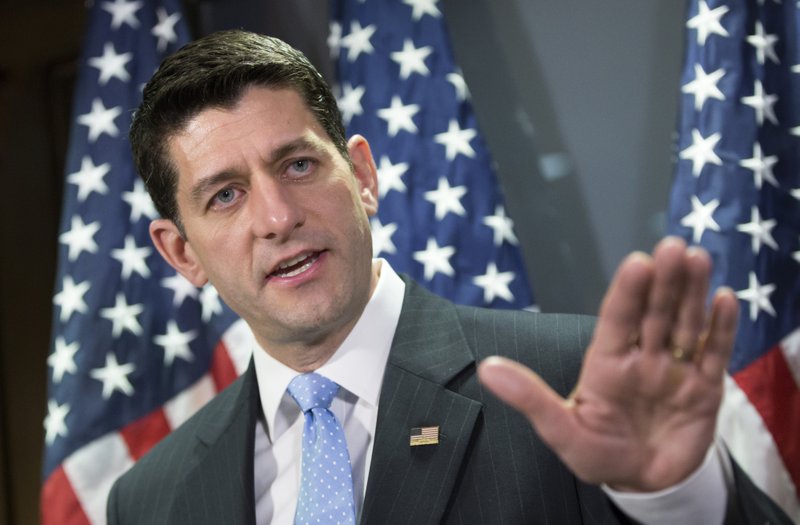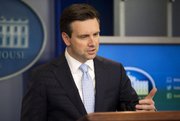WASHINGTON -- President Barack Obama invited the Republicans who run the House and Senate to the White House on Tuesday to try to hash out an agenda for his final year.
RELATED ARTICLE
http://www.arkansas…">Senators float Iran sanctions
Obama's meeting with House Speaker Paul Ryan was his first since the Wisconsin Republican took the helm more than three months ago. Obama and Ryan planned a private lunch after a joint meeting with Senate Majority Leader Mitch McConnell and Vice President Joe Biden.
Before the meeting, Ryan told reporters that he was excited to see the start of voting in Iowa's presidential caucuses Monday night because "what it tells me is the days of Barack Obama's presidency are numbered."
White House spokesman Josh Earnest, trying to frame the comment in a positive light, said that if the fact that Obama only has a year in office left makes it easier for Republicans to work with him, "then maybe we should hold the Iowa caucus every day."
As Ryan swept into the speakership in October, the White House was cautiously optimistic that the policy-minded Republican, given a powerful mandate by his unruly caucus, might be able to work with Obama in 2016 on a narrow set of issues with some bipartisan overlap.
Although Obama has scaled back his legislative ambitions from the proposals he pushed earlier in his presidency, he still needs Congress to help finish what he's started in certain areas -- trade being chief among them.
"They just need to touch gloves," joked House Rules Committee Chairman Pete Sessions of Texas, likening the meeting to two fighters obligingly greeting before the opening bell.
"But they do need to try and get some things done," he said.
Ryan, speaking after the weekly GOP caucus, said he and Obama get along personally but have their policy differences. He said he hoped they could "put those disagreements in check and see where the common ground is."
"He knows how I feel, and I know how he feels," Ryan said.
Earnest said the president spent time during the meeting laying out five areas where he's hopeful the White House can work with the GOP-controlled Congress, including Puerto Rico's financial crisis, the Trans-Pacific free-trade deal, pursuing cures for cancer and a criminal justice overhaul. Earnest said those topics are being brought up by GOP presidential candidates on the campaign trail, so they should be areas for bipartisan cooperation.
The speaker also discussed the administration's interpretation of changes to the visa-waiver program that would allow certain people who have traveled to nations connected to terrorism concerns, such as Iran, Iraq, Sudan and Syria, to enter the U.S. visa-free. Republicans have said this is contrary to the intent of provisions in the $1.1 trillion spending law passed in December.
Obama and Ryan are aligned in a few policy areas. The speaker has supported Obama's Trans-Pacific Partnership. The president is seeking final congressional approval for the vast free-trade deal with Asia, which most Republicans support and most Democrats oppose.
For the Senate, McConnell said that while he backs free trade, he has "problems" with the Trans-Pacific agreement and doesn't want Congress to vote on whether to approve it before the election. "There are a number of flaws here," McConnell said.
Ryan also largely agrees with Obama's proposal to overhaul the criminal justice system by reducing prison sentences for nonviolent drug crimes. In an early sign of progress from Congress, a Senate panel approved legislation easing strict sentencing requirements for some nonviolent offenders.
But McConnell has not committed to a floor vote, and the bill's GOP backers downplay prospects for a breakthrough this year. In the House, Ryan's deputy, Majority Leader Kevin McCarthy, on Monday became the latest Republican to suggest the bill might need to wait until next year, when Obama steps aside.
Later, McConnell told reporters that Republicans may be able to work with the Obama administration to address opioid addiction and the Zika virus, the mosquito-borne outbreak that the World Health Organization has declared a public health emergency.
The president and lawmakers had "a kind of general discussion" about Puerto Rico, McConnell added.
"No solution to the Puerto Rico problem that involves the use of taxpayer dollars is going to be passing in this Congress," McConnell said. "We'll still be grappling with a way to do something that allows them to restructure."
Aides to the Republican leadership listed a number of other topics the president and speaker addressed, including North Korea sanctions, energy legislation, Biden's cancer initiative and closing the Guantanamo Bay prison camp in Cuba.
Obama's call for a new war authorization was another focus, though Republicans and Obama disagree sharply about what limitations should be included.
After his lunch, Ryan returned to the House for a vote to override a presidential veto on a bill repealing the Patient Protection and Affordable Care Act, but Republicans failed to reach a two-thirds majority. Arkansas' four representatives, all Republicans, voted to repeal the act, putting the final margin at 241-186. Ryan said he mostly wanted to show his conservative base that the House tried.
budget friction
As the 2016 legislative session kicks into gear, Republican leaders are hoping for a smooth and speedy budget process. Ryan and McCarthy are promising to release the GOP's official spending blueprint within the next several weeks, and Obama has promised to present his own version by next week.
But GOP leaders are battling a small group of conservatives who want them to retreat from last year's budget deal with Obama and fellow Democrats, which increased spending by $30 billion over the coming year.
Some Republicans are complaining that the new budget should jettison the increases agreed to in the two-year deal.
In response, McCarthy and other House Republican leaders are discussing ways to again turn to the reconciliation process that set up the repeal vote on the Affordable Care Act, allowing conservatives to vote on priorities like overhauling the tax code and welfare policy as a consolation for spending increases.
"We haven't looked at exactly what reconciliation would be used for," McCarthy told reporters on Monday. "There are a lot of opportunities out there."
Ryan supported the $1.1 trillion budget deal, despite calling it a "crap sandwich" and promising to slash spending and balance the budget in 10 years. As the former Budget Committee chairman, his previous budgets included vast proposals to revamp entitlement programs while also cutting taxes.
McCarthy on Monday tried to tamp down talk of a GOP proposal that would decrease the spending agreed to in last year's deal. He argued the best way to slash spending is to change entitlement programs like Social Security, Medicaid and Medicare. The budget talks should be focused on balancing the existing commitment, he said.
"We all know the big problem is entitlement and mandatory" spending, McCarthy said. "I look to us sticking to the number we have."
Republicans want their budget bid to be focused on cutting spending and ending the deficit, which is expected to climb to $544 billion this year, according to the Congressional Budget Office. The $105 billion increase was mostly due to tax cuts enacted as part of the budget deal Ryan helped pass last year.
"It's so important that we hit the ground right this year," said. Rep. Ted Yoho, R-Fla. "$30 billion, that's a ton of money," he added, referring to the amount added to government spending in last year's budget deal.
He said nobody liked being forced to pass an omnibus spending bill -- explaining that passing this year's budget is the first step to preventing that from recurring.
McCarthy avoided offering any specific explanations of how the pending budget legislation would stick to previous commitments. He said he and Ryan met with House Budget Committee Chairman Tom Price, R-Ga., and they are looking to move things as quickly and collaboratively as possible.
"We are looking over all that we want to balance," McCarthy said. "We've found ways that we can find the savings."
Information for this article was contributed by Josh Lederman of The Associated Press; by Billy House, Toluse Olorunnipa and Kathleen Miller of Bloomberg News; and by Kelsey Snell of The Washington Post.
A Section on 02/03/2016



